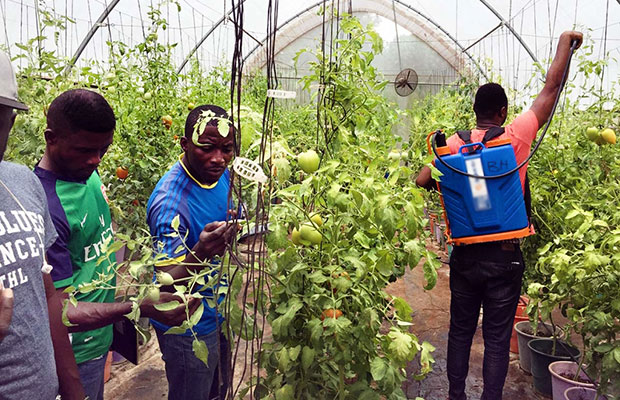
New Program Plants the Seeds of Hope in Ghana
Youth migration—and the poverty that drives it—is a key concern for Salesian missionaries serving in Ghana. Here, a budding agricultural project promises to cultivate a new generation of skilled farmers whose capabilities will command a decent salary, contribute to their country’s sustainable development, and inspire others to plant the seeds for their own bright futures at home.
First launched in 2016, the Salesian Agricultural School of Sunyani has so far trained 93 students in organic farming practices and the use of greenhouses. In addition to increasing yields, these capabilities help combat deforestation and better manage climate extremes through sustainable production practices that support longer growing seasons, as well as increase access to local food throughout the year.
The school is part of a larger Salesian-led “Stop Human Trafficking” campaign, whose goal is to keep youth from migrating out of Ghana by offering the education and resources they need to earn a living safely at home. Those who leave in search of greater fortunes abroad are at high risk for exploitation and abuse, although many aren’t aware of the dangers before they go. For that reason, “Stop Human Trafficking” also works to inform youth of migration’s harsh realities—and the alternatives.
Many students at the Salesian Agricultural School are returned migrants themselves, now committed to staying in rural Ghana. To help support their commitment, the school created the Fund for Agricultural and Tourism Development as a way to provide micro-credit financing to aspiring farmers. The top four students in the most recent graduating class were awarded grants to launch their own agricultural operations.
“Vocational training in eco-sustainable agriculture is providing many young people the opportunity to learn a trade, create new jobs and as a result, help prevent migration and trafficking,” says Fr. Mark Hyde, director of Salesian Missions. “Small-scale farms in Ghana often suffer from a lack of infrastructure and equipment, both of which are necessary in order to shift away from subsistence farming to a more commercialized approach. By learning modern methods and practices, students will be able to earn a more stable living.”
By returning home, and returning to the land, they are also helping Ghana build a more self-sufficient future…one in which future generations can live comfortably.
Our mission fights poverty by keeping rural communities intact. What’s your mission?
Learn more about our work in Ghana.

